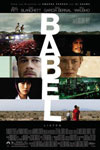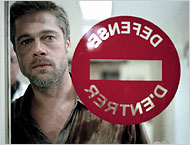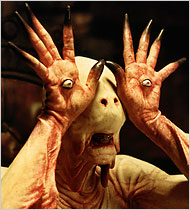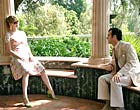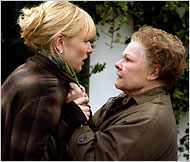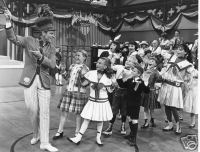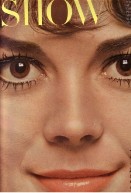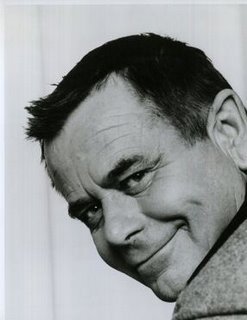
Glenn Ford stood apart from his peers who also became Hollywood legends.
There was nothing timid about Ford, and yet he's the only major actor of his generation one doesn't immediately link with a certain role or with certain films - the way one does with such Ford peers as, say, William Holden ("Stalag 17" and "Sunset Boulevard"), Henry Fonda ("The Grapes of Wrath" and "Mr. Roberts") and Jimmy Stewart ("It's a Wonderful Life" and "The Philadelphia Story").
This is odd, because Ford's screen persona had always been a compelling one - at once easygoing, tough and introspective.
And yet he, somehow, curiously, established no personal identity - either on screen or with the public.
What this means is that Glenn Ford starred in movies, almost 100 of them, without ever dominating or overwhelming them. He never demanded attention from the viewer, with the result being that he was rarely recognized by critics for his body of work and he was never recognized by his own industry for some truly solid, if somewhat self-effacing, performances. His son, Peter, had unsuccessfully lobbied for the past few years for the Academy of Motion Picture Arts and Sciences to give his father a lifetime achievement Oscar.
The fact that Glenn Ford never won an Academy Award and was never nominated for one might have something to do with his choice of roles (or the roles that his studio, Columbia, picked out for him) and the kinds of performances he gave. Ford was never shamelessly sentimental or emotional on screen (the kind of qualities that breaks hearts and wins Oscars) and he was always too much of a generous performer and team player to nudge his co-stars off screen.
He was an adjustable wrench among actors: He turned in highly credible, lifelike performances in a wide variety of roles and movies, moving from film to film, churning them out but never looking over his shoulder for the recognition that he so richly deserved.
"I had always marveled at the subtlety of his work," Sidney Poitier, his co-star in "The Blackbaord Jungle, told The Associated Press at the time of Ford's death on August 30th, 2006.
Ford was much more of a character actor who happened to play leading roles than an out-and-out lead player, and much more of an actor and less a personality than the other superstars of his generation.
Much of this had to do with the fact that Ford almost literally started life as an actor, even though there wasn't a history of acting in his family. Born Gwyllyn Samuel Newton Ford on May 1, 1916, in Quebec City, Canada, Ford moved to Santa Monica with his family when he was 8. His father was an executive in railroads and manufacturing, and his family was peopled with names prominent in both Canadian and U.S. politics, including the MacDonalds and the Van Burens.
But Ford was interested in acting, and early on he used to stage his own plays in his family's barn, coaxing his friends and the neighborhood kids to play along with him. He had no formal training in theater at this age; he "invented" theater for himself and was soon playing parts in school plays, becoming active in the theater department of Santa Monica High School. He opted for several West Coast stage companies over college and by the late '30s was a staple of the New York theater scene, where he was spotted by a Hollywood talent scout and tested and signed by Columbia Pictures.
Ford's father went along with his son's ambitions, insisting only that Ford learn how to use tools in case he needed a trade to fall back on. He didn't, of course, although throughout his life Ford used the crafts he learned as both a hobby and form of off-screen relaxation.
His first notable stage role was as the grocery boy in the West Coast company of Lillian Hellman's "The Children's Hour," touring the West before becoming a resident player of the Santa Monica Players, for whom he portrayed the brutish Michael Rakovsky in Elmer Rice's "Judgement Day." Before and after his signing with Columbia, he played in a string of Broadway plays, the most notable being the lead in Clifford Odet's "Golden Boy" (a role played on film by his good friend, William Holden).
Originally, Columbia wanted to call him John Gower (after Gower Street, on which the studio was located) because Gwyllyn was too hard to pronounce. There was a compromise, however, when Ford remembered Glenford, the mill town in Quebec where his father was born.
This is how "Glenn Ford" was born.
His first movie role was a supporting one - for Fox, on a loan-out - in Ricardo Cortez's "Heaven With a Barbed Wire Fence" (1940). Ford then went on to make 13 films for Columbia between 1940 and 1943, including George Marshall's popular "Texas" (1941) with Holden, before his career was halted by World War II.
Ford served in the Marine Corps until 1946. When he returned to films, he was in the singular position of having to start over again because, again, he had established no personal identity with the public in those first 14 films.
And although he revived his career with meaty roles in two successful 1946 films - Curtis Bernhardt's "A Stone Life" with Bette Davis and Charles Vidor's "Gilda" with Rita Hayworth (with whom he would make several steamy films) - he couldn't get over the first impression he had made, namely that of a chameleon, workmanlike actor.
Ford's most productive period was the mid-1950s, a time when he'd bounce from dark dramas such as Richard Brooks' "The Blackboard Jungle" (1955) to tearjerkers like Curtis Bernhardt's "Interrrupted Melody" (also '55). It was during this period when he appeared in a series of popular armed services comedies - Daniel Mann's "The Teahouse of the August Moon" (1956) and Charles Water's "Don't Go Near the Water" (1957) - as well as some wonderful Westerns - Russell Rouse's "The Fastest Gun Alive" (1956), Delmer Daves' "3:10 to Yuma" (1957) and "Cowboy" (1958) and George Marshall's "The Sheepman" (also '58).
Ford loved Westerns and, reportedly, had some firm ideas about them. He saw them as a peculiarly American art form irrevocably linked to the physical American West itself - that the magic of it was the sense of place it conjured up. They had to be filmed in the real place, not in Yugoslavia or Italy.
If a Glenn Ford Film Festival were put together, the films that should be screened would include "Texas," "Gilda," "The Blackboard Jungle," "3:10 to Yuma" and "Cowboy," as well as George Marshall's antic "The Gazebo" (1959), Anthony Mann's remake of "Cimarron" (1960), Frank Capra's "Pocketful of Miracles" (1961), Blake Edwards' "Experiment in Terror" (1962), Delbert Mann's "Dear Heart" (1964), Burt Kennedy's "The Rounders" (1965) and Richard Donner's "Superman" (1978), in which Ford played Clark Kent's father.
Hell, I'd use them all!
Glenn Ford's films:
Heaven With a Barbed Wire Fence (1940)
Men Without Souls (1940)
My Son I Guilty (1940)
Convicted Woman (1940)
The Lady in Question (1940)
Babies for Sale 91940)
Blondie Plays Cupid (1940)
So Ends Our Night (1941)
Texas (1941)
Go West, Young Lady (1941)
The Adventures of Martin Eden (1942)
Flight Lieutenant (1942)
Destroyer (1943)
The Desperadoes (1943)
Gilda (1946)
A Stolen Life (1946)
Gallant Journey (1946)
Framed (1947)
The Mating of Millie (1947)
The Loves of Carmen (1947)
The Return of October (1947)
The Man From Colorado (1948)
The Undercover Man (1949)
Mr. Soft Touch (1949)
The Doctor and the Girl (1949)
The White Tower (1950)
Convicted (1950)
The Flying Missle (1950)
The Redhead and the Cowboy (1950)
Follow the Sun (1951)
The Secret of Convict Lake (1951)
The Green Glove (1952)
Young Man With Ideas (1952)
Affair in Trinadad (1952)
Terror on the Train (1953, a.k.a. Time Bomb)
The Man From the Alamo (1953)
Plunder of the Sun (1953)
The Big Heat (1953)
Appointment in Honduras (1953)
Human Desire (1954)
The Americano (1955)
The Violent Men (1955)
The Blackboard Jungle (1955)
Interrupted Melody (1955)
Trial (1955)
Ransom! (1956)
Jubal (1956)
The Fastest Gun Alive (1956)
The Teahouse of the Augut Moon (1956)
3:10 to Yuma (1957)
Don't Go Near the Water (1957)
Cowboy (1958)
The Sheepman (1958)
Imitation General (1958)
Torpedo Run (1958)
It Started With a Kiss (1959)
The Gazebo (1959)
Cimarron (1960)
Cry for Happy (1961)
Pocketful of Miracles (1961)
The Four Horsemern of the Apocalypse (1962)
Experiment in Terror (1962)
Love Is a Ball (1963)
The Courtship of Eddie's Father (1963)
Advance to the Rear (1964)
Fate Is the Hunter (1964)
Dear Heart (1965)
The Rounders (1965)
The Money Trap (1966)
Is Paris Burning? (1966)
Rage (1967, a.k.a. El Mal)
The Last Challenge (1967)
A Time for Killing (1968)
Day of the Evil Gun (1968, a.k.a. Evil Gun)
Smith! (1969)
Heaven With a Gun (1969)
Santee (1973)
Jarrett (1973, for TV)
Punch and Jody (1974, for TV)
The Greatest Gift (1974, for TV)
The Disappearance of Flight 412 (1974, for TV)
Midway (1976)
Goodbye and Amen (1978)
Superman (1978)
Day of the Assassin (1979)
The Visitor (1979)
Evening in Byzantium (1979, for TV)
Beggarman, Thief (1979, for TV)
The Gift (1979, for TV)
The Sacketts (1979, for TV)
Virus (1980)
Happy Birthday to Me (1981)
Border Shootout (1990)
JFK (1991, scenes deleted from released version)
(Artwork: A vintage publicity shot of Glenn Ford)
* * *
Anyone interested in perusing some 2060 of my film reviews, dating back to 1994, can do so by simply going to RottenTomatoes.Com
